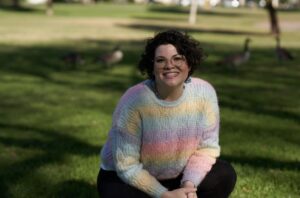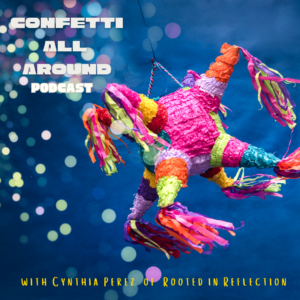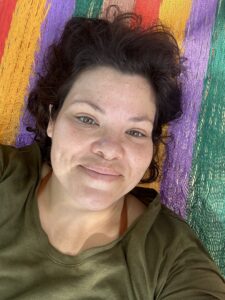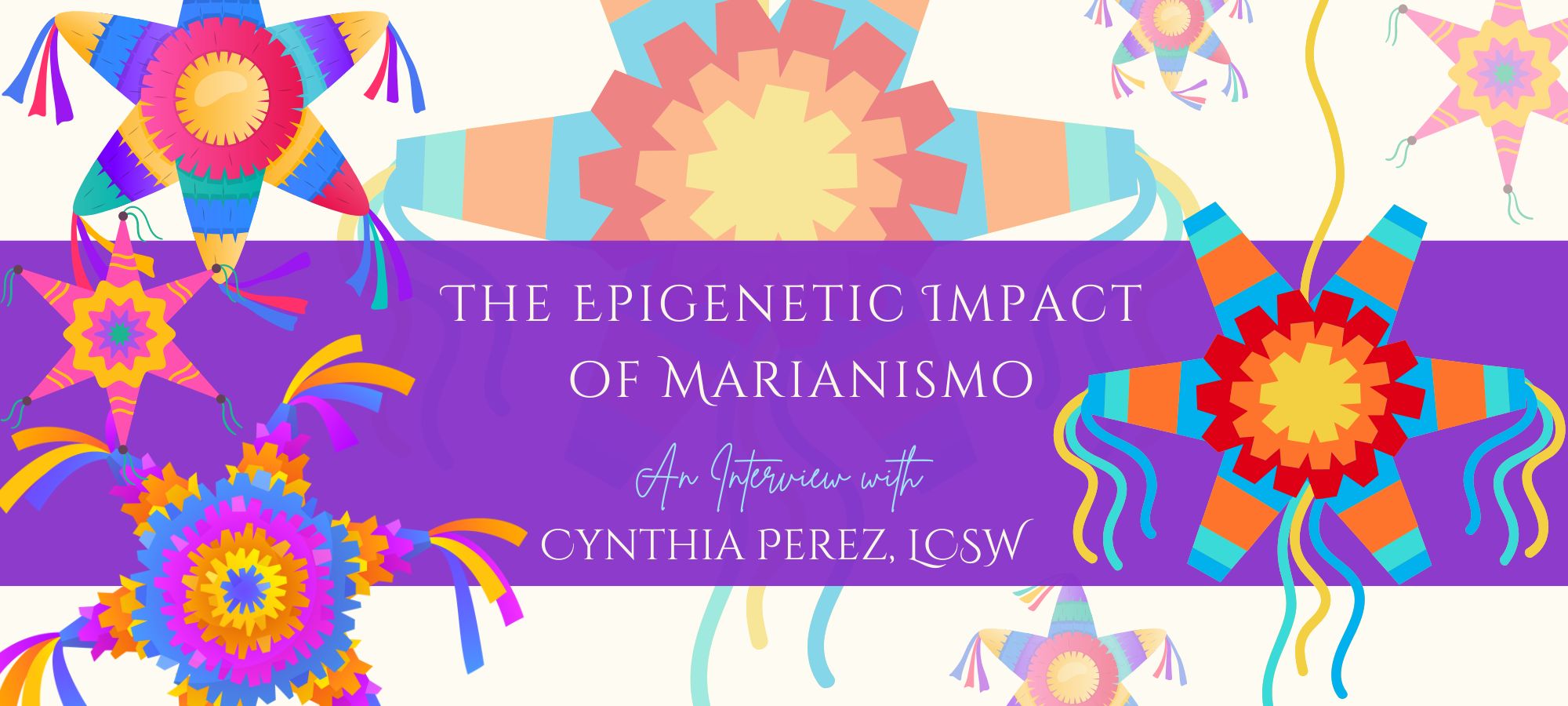Cynthia Perez, LCSW, is the founder of Rooted in Reflection, and will be presenting “The Epigenetic Impact of Marianismo: Unburdening Myself and My Lineage,” a 1-hour free webinar on November 14, 2024, 12-1pm PT, through Pacifica Extension and International Studies. Register here.
Angela Borda: Thank you so much for speaking with me today. Your upcoming talk focuses on unburdening yourself and your lineage. For an introduction, I’d love it if you would share about your lineage and background.

Cynthia Perez: My family comes from Mani and Merida, Yucatan, Mexico, which is the Southern-most tip of Mexico. My family goes back to the 1600s in Mani, which was the first pueblo that was colonized by Spain. It’s where they burned the Maya codices in the church built there to convert the Maya. They were brought there and either had to be baptized or they would be killed. This is where Diego de Landa of Spain burned their books and tools of the Maya. It’s the reason why I do the work that I do.
I was born in Carson, California, and my maternal grandparents previously worked in the fruit fields of Oxnard while my mom was a child. So I identified as chicana from the United States, but I have awakened into this next era of my process of discovering my lineage and these puzzle pieces of our history. Pueblo Mani is considered a magical pueblo because there are three generations there, the Maya, the Spanish, and the Mestizo, and therefore it has certain historical rights. In ancestral healing, it’s important that the medicine must also be ancestral as well. Given we are a colonized land and people, what would my ancestors do to heal?
Angela: The title of your webinar is “The Epigenetic Impact of Marianismo: Unburdening Myself and My Lineage.” I hadn’t heard the term “Marianismo” before. Please give us an idea of what this is and what an epigenetic impact means in this case.
Cynthia: Marianismo is a term coined in the 1960s, and it refers to values that are also beliefs or ways of being that are gender constructs rooted in Catholicism and the need for the woman to be of service to the man, while the man is expected to be of service to God. We’ve been socialized to these norms, and we’re supposed to be an example of the Virgin Mary, who is humble, of service to all, and that’s how we’ve been socialized as Latinas. I hold space for first generation and immigrant clients longing to have compassion for our sacred intersecting mother wounds.
I love this book by Natalie Gutiérrez, The Pain We Carry. It made my stomach drop and when she talked about legacy burdens, our genes that we have inherited in our survival, I thought about how deep that goes. Our epigenetics is an evolutionary gene. If you’re in survival mode, your epigenetic switch is active, in flight or flight mode. Marianismo has impacted our survival genes, and a lot of these behaviors we see in our mothers in the Latina diaspora are now in our epigenetic genes and are impacting our nervous systems when we feel unsafe. Epigenetics can go both ways though. If you’re conditioning your anger and jealousy, then that gene is going to be really strong. The work is being in joy, in rest, in observation of. What were our ancestors doing to do that? Go do that to find your joy, your medicine.
Angela: You founded Rooted in Reflection. What is the aim and function of the organization and what inspired you to start it?
Cynthia: In 2021, I was working for the leading healthcare agency that developed the ACES framework, and I realized that we weren’t using ACES to inform our care as therapists. During the pandemic, I realized we needed more joy and more soft places for connection. I started creating spaces to heal our inner child; it looked like six week virtual groups using epigenetics and how our inner child meets the neuroscience. Since then, I’ve created 14 cohorts. It was my idea to create what I wasn’t seeing, so I started with therapy on the land. I come from hammock weavers, embroiderers, and builders, so I realized I’m someone who creates. So I do hammock meditations on the land, using the hammocks given to me by my grandmother. These are sacred somatic ceremonies that are in agreement with my ancestors and the intention of the client and their ancestors.
Since 2022, I have partnered with Latinx Therapy to provide Continuing Education Courses and workshops. I have courses that cover ancestral healing with ancestral altars, creating spaces where we want to show up and explain how “Inner child Healing Is Intergenerational Healing.” Since then, I’ve hosted over 25 community events in Long Beach and Compton. I get to use all the things my inner child loves and create whimsical spaces. We’ve done self-compassion using DIY crafts like inner child altars and rituals, creating a whimsical fairy tale mirror or an altar for your inner world. It allows us to soften and notice. We also have clinical education and on-the-land coaching.
Angela: The website for Rooted in Reflection indicates that your “educational workshops and platicas blend psychosocial science, epigenetics, and indigenous practices to understand polyvagal toning as our indigenous practices and sacred joy.” From this I take it that the vagus nerve is central to your therapeutic method?
Cynthia: Often I think about my work and I can’t believe we don’t talk about it more in the spaces I’ve worked in. So I started hosting the conversation. When we tone all the nerves that are attached to the vagus nerve, which attaches to our survival brainstem, it’s like ringing the bell. The vagus nerve sends the healing energy to the whole body, sending the message of being grounded in the present moment and resources. We started to do practices with stretching or crying or humming and chanting. You are informing your nervous system that you’re safe and grounding yourself in your own life force energy. Playing in water, riding a bike, coloring, imagining (guided visualization), splashing, swaying.
We’ve westernized things that indigenous people have already been doing.
In my lineage, we rest and play in hammocks, rocking and feeling the wind. Singing songs to our children as we push the hammock and create a loving eco-system. A lot of our traditions are polyvagal toning. When I do telehealth therapy, I might use a drum and chanting, which is bilateral stimulation. Our communities have been doing this for a long time. We’re unlocking our epigenetics and inner child healing.
Angela: What are you most looking forward to in giving the webinar? Who would benefit from attending?
Cynthia: I’m most excited to know what people want to talk about; for their questions. My favorite part is the reflections people share. When they share their stories, it’s collective healing. I’m excited for the conversation to take place and to put womb-holders in the forefront of the conversation. Anyone is welcome to attend.
Angela: Are there any projects or publications you’re looking forward to putting out? Anything on the horizon the Pacifica community might like to know about?
 Cynthia: I have three courses on Marianismo, which you can find on my website, and I’m self-publishing my fourth book, a workbook that gives tips on gentleness and how to work through this Marianismo discovery within ourselves, “My Marianismo: Unburdening Myself From the Roots to the Bloom.” And I’m co-sponsored by Latinx Therapy to host Continuing Education courses in the fall.
Cynthia: I have three courses on Marianismo, which you can find on my website, and I’m self-publishing my fourth book, a workbook that gives tips on gentleness and how to work through this Marianismo discovery within ourselves, “My Marianismo: Unburdening Myself From the Roots to the Bloom.” And I’m co-sponsored by Latinx Therapy to host Continuing Education courses in the fall.
I host a podcast that is a good, free resource to people who don’t go to therapy or don’t have easy access to it. I have therapists who talk about ancestral doll-making or are curanderas or authors. If you’re wondering how to start in this decolonial work, my podcast is called “Confetti All Around.”
Angela: Thanks so much for speaking with me. I look forward to your webinar!
“The Epigenetic Impact of Marianismo: Unburdening Myself and My Lineage,” a 1-hour free webinar on November 14, 2024, 12-1pm PT, through Pacifica Extension and International Studies. Register here.

Cynthia Perez, LCSW is the founder of Rooted in Reflection, a wellness agency creating soft spaces for intergenerational healing “from roots to bloom”. Cynthia is an author, therapist, host of the Confetti All Around Podcast, and a clinical educator. She hosts clinical educational courses and workshops to support clinicians and students working with the Latine and Indigenous communities in complex trauma informed care. Cynthia has created a framework for addressing intergenerational trauma through “Marianismo” through polyvagal toning rooted in epigenetic science and indigenous intuition. Cynthia’s work highlights the science of inner child healing through ancestral lineage repair as intergenerational and inner-generational healing. www.rootedinreflection.org

Angela Borda is a writer for Pacifica Graduate Institute, as well as the editor of the Santa Barbara Literary Journal. Her work has been published in Food & Home, Peregrine, Hurricanes & Swan Songs, Delirium Corridor, Still Arts Quarterly, Danse Macabre, and is forthcoming in The Tertiary Lodger and Running Wild Anthology of Stories, Vol. 5.


